Where Do You Get Your Myths?
A Roundtable Discussion With Teresa Edgerton, Sean Russell, Martha Wells, and Janny Wurts Note: This feature is the transcript from a live event
produced by SciFi.com for HarperCollins.
The
live event took place online during the annual Internet-only
science fiction/fantasy conference, EosCon 4.0. The topic of
this panel was "Where Do You Get Your Myths?" The panelists
were bestselling fantasy authors Teresa Edgerton, Sean Russell, Martha Wells, and Janny Wurts.
Note: This feature is the transcript from a live event
produced by SciFi.com for HarperCollins.
The
live event took place online during the annual Internet-only
science fiction/fantasy conference, EosCon 4.0. The topic of
this panel was "Where Do You Get Your Myths?" The panelists
were bestselling fantasy authors Teresa Edgerton, Sean Russell, Martha Wells, and Janny Wurts.
Moderator: Hi everyone, welcome to EOSCON 4.0. I'm your Moderator for SCIFI. This hour we're chatting with writers Teresa Edgerton, Sean Russell, Martha Wells, and Janny Wurts. The topic is the impact of seminal fantasy works/ideas (e.g., Tolkien, the Arthurian legend, etc.) on their writing, and other influences -- literary or other -- from within and outside the genre. Ok, let's get started. Who was the first fantasy writer to fire up each of your imaginations?
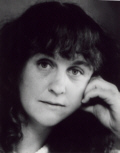 Teresa Edgerton
Teresa Edgerton
|
Janny Wurtz: The title of the book was, the City under the Back Steps, it was about ants, and I can't recall the author -- also, faery tales.
Martha Wells: For me it was André Norton.
Sean Russell: Tolkien was the first fantasy writer to really interest me.
Teresa Edgerton: Did you use what you learned about ants in any of your stories, Janny?
Janny Wurtz: Well, it was my first experience imagining myself living in an alien environment, looking at the world from a totally different perspective -- something the best sort of fantasy is very strong at.
Moderator: How do we differentiate between influence of say Tolkien, and the very real myths that come up from antiquity? Or is that even important?
Teresa Edgerton: That's hard to say, since Tolkien was also very much influenced by ancient myths.
Sean Russell: I don't think the source is important. You can make up your own myths or even use history as a basis.
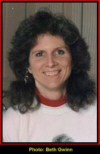 Janny Wurtz
Janny Wurtz
|
Sean Russell: I think what myth does is give the story resonance. That is its importance in this kind of work.
Moderator: Doesn't using existing myths limit the author -- and risk having the reader work out what's coming too soon? How can you get a real surprise into the Arthurian story for example?
Janny Wurtz: That's why I don't write Arthurian fiction, from the known character's viewpoint.
Martha Wells: You can use the myth as a starting point, and then add your own imagination to it.
Teresa Edgerton: I think it may go back to what I said in the previous panel ... That anticipating the ending can be part of the pleasure for some readers.
Martha Wells: You can also use myths that are not that common, so people aren't familiar with them.
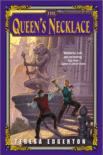
|
Sean Russell: I agree with Martha: if you have to use myths, then look for a new source.
Martha Wells: You could also use a familiar myth, and play with people's expectations about what is going to happen.
Moderator: Although this question isn't so much about where myths come from, it is something that I've wanted to ask fantasy writers lately. :) After Star Wars, there were science fiction writers who felt that the success of the films actually retarded sf in a sense. Everybody wanted space epics. Could the Lord of The Rings films have the same impact on fantasy, setting back some the really interesting recent trends in current fantasy?
Janny Wurtz: The setbacks we've seen from released fantasy films have already happened -- in the public perception, thinking the movies and the books are the same sort of theme.
Sean Russell: It will be interesting to see. I tend to think that you have different kinds of readers -- those who want something fresh and those who don't. I don't imagine the films will change that.
Martha Wells: What Sean Russell said. :)
Moderator: So Sean Russell, the audience for China Melville is different than the audience for a book about furry little creatures with pointy ears?
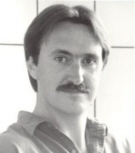 Sean Russell
Sean Russell
|
Moderator: When you are starting a new work/series, how do you go about creating a believable myth structure? Research, inspiration, or just natural ability?
Teresa Edgerton: By cutting edge fantasy, do you mean contemporary fantasy? Urban fantasy?
Martha Wells: Research plays a very important part for me.
Teresa Edgerton: First I make a map. Then I rely on all of the above.
Janny Wurtz: I begin with imagination. Let what happens lead me from there. The structure tends to dictate itself, from that point.
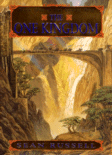
|
Teresa Edgerton: Sometimes the world seems to create itself. But there is always a lot of research before that happens.
Janny Wurtz: The myths that are prevalent in any society tend to spring out of the fabric of the culture itself -- therefore, the myths on a fantasy world would be shaped by the cultures that inhabit the world.
Teresa Edgerton: The research goes in, gets thoroughly digested (I hope!) and then comes out as something new.
Teresa Edgerton: Good point, Janny Wurtz. But the myths would also be shaped by geography, weather, all sorts of physical things.
Janny Wurtz: That's why I feel that research in the myth area is not relevant -- unless you're working with an earth myth, specifically.
Moderator: Do you think adding a mythic quality to your works makes them more powerful?
Janny Wurtz: All human cultures have myths -- if you have humans, there will be those stories with their warp and weft of underlying truths and values -- which is what makes a myth.
Teresa Edgerton: I think myths make it, oddly enough, more realistic. Because of what Janny Wurtz just said.
Sean Russell: I tend to think that background gives your story depth. Do the people in a given place and time look at their myths as history or fantasy? In my books they think it's history.
Martha Wells: A culture without any mythic background would feel very flat and unrealistic in a book.
Teresa Edgerton: Right. A book needs texture, and mythology, religion, etc. are part of that texture. Or can be, I should say.
Sean Russell: Texture and resonance. Those make sense to me.
Janny Wurtz: Unless what you have is not a human culture.
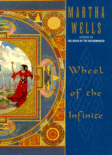
|
Teresa Edgerton: If the culture is too inhuman, it's hard for readers to understand or relate.
Janny Wurtz: Readers can well relate if there is an Alien Reason for no myths -- I'd hate to underestimate their intelligence -- the aliens, and the readers -- (grin).
Moderator: Next Question: Along those lines does every contemporary human culture continue to generate myths that future writers can mine?
Janny Wurtz: Well, the lady who put her dog in the microwave is certainly a modern myth...
Sean Russell: I think we take history and turn it into myth. You can see this in American culture where there have been books and films trying to de-mythologize certain people or events. Was Billy the Kid or Robin Hood really a bad guy?
Teresa Edgerton: Princess Diana is already a modern myth.
Janny Wurtz: So is Jacqueline Kennedy, and probably her first husband, too.
Teresa Edgerton: Yes, even from a little distance we can see the mythology of the American West ... but it is harder to judge the myths being created now. Except in really obvious cases, like Di and the Kennedys.
Teresa Edgerton: I should say identify, rather than judge.
Janny Wurtz: That's because we still look on them as "history."
Teresa Edgerton: But in the Princess Diana story ...a hundred years from now...Queen Elizabeth may be the ogre mother-in-law who devours her own grandchildren ...
Teresa Edgerton: with sauce Robert.
Moderator: Speaking of religion, where do you feel (in fiction, that is) that the line between myth and religion should be drawn? I'm thinking of some of our earlier Christian Fantasy writers, Lewis, Tolkien, particularly.
Janny Wurtz: Tolkien didn't have much in the way of religion in it, as I recall.
Teresa Edgerton: Not in Lord of the Rings, but in the Silmarillion and other books he did.
Janny Wurtz: I confess that I never finished that work.
Sean Russell: Classical mythology is all about Gods. Did people believe in those Gods? I tend to think that if it's your belief system it's religion. If it's somebody else's, it's mythology.
Teresa Edgerton: Sometimes it is impossible to draw a line. In some of my own books, religion and mythology are pretty well mixed together.
Janny Wurtz: Somebody else better do the line drawing, in this case -- I'm not qualified. I think what people choose to take in and take seriously is their own thing. I think I have to disagree with mythology and religion being synonymous -- or a factor of belief or non-belief. Myth is a structure of values, set into a story. Religion is something vastly other.
Sean Russell: You don't think that religion is a structure of values?
Teresa Edgerton: For some people I know religion is all about values.
Janny Wurtz: I think religion is far more than that, to aspects of its values could be set into a story that is structured as a myth.
Sean Russell: The Old Testament reads like myth to me.
Janny Wurtz: I should think a serious take at religion would have to include the structure of life, the universe, and our place in it, not just what values go into that.
Teresa Edgerton: And what about the Apocrypha -- myth or religion?
Martha Wells: But myths also attempt to explain the structure of the universe too.
Teresa Edgerton: So are you saying that religion includes mythology -- but is also much more?
Janny Wurtz: Myth -- definitely -- myths can also carry a definition of truth in story form, for those who wish to attach belief to Apocrypha.
Sean Russell: Good question. The Catholic church seemed to decide those books were myth -- or at least not religion.
Teresa Edgerton: But surely the people who wrote those books thought they were talking about religion.
Sean Russell: What do you think the people who created myths were thinking? I wonder.
Teresa Edgerton: I think they thought they were writing about religion, too. Which is why the line is hard or impossible to draw.

|
Teresa Edgerton: I'm thinking about, for instance, the Dead Sea scrolls.
Janny Wurtz: No two people can think the same way, precisely, which is why the lines are blurred, always.
Sean Russell: I suspect the dogma is created by organized churches. The narratives that make up the basis of their religion/myth is often quite free of it.
Janny Wurtz: Depends who wrote down the narrative, whether it's free of dogma.
Moderator: And I think we'll make this the last one for this session. Out of curiosity, is there a myth, or a legend, or a bit of history that each one of you would perhaps like to write about, but that you choose not to write about for one reason or another? What makes a myth off-limits?
Moderator: What if John Wilkes Booth Shot My Grandfather?
Sean Russell: I don't think anything is off limits. I write about the things that interest me.
Teresa Edgerton: I would not write a mythic version of the Jesus story. It's been done very often and done better than I could do it.
Janny Wurtz: Certain myths are considered sacred to certain living cultures -- I would not use one that I was not entitled to, at any cost.
Martha Wells: I really don't think anything is necessarily off-limits.
Janny Wurtz: Nothing is off limits to free will -- it's merely ethics.
Teresa Edgerton: It depends partly on whether you think you have anything new or valuable to say on that particular theme.
Martha Wells: I guess I'm unethical. :) My last book was heavily based on Asian myth, which I'm not entitled to.
Moderator: We're out of time. Thanks for a great panel!
Copyright ©2001 by HarperCollins. All Rights Reserved. Reprinted with permission. Reproduction or dissemination of this transcript in any manner whatsoever is strictly prohibited.
Photograph of Janny Wurtz by Beth Gwinn.
Photograph of Sean Russell by Don Deese.
Return to the June 2001 issue of The IWJ.
More from Writers Write
